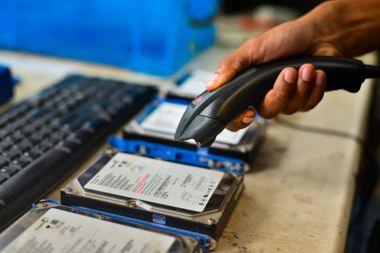Secure Disposal: The ABCs of Computer Recycling
Wiki Article
Sustainable IT Solutions: Trustworthy Computer System Recycling Provider
In light of this, the requirement for credible computer reusing solutions has actually never been more critical. In this conversation, we will check out the environmental impact of e-waste, the advantages of accountable computer recycling, just how to pick a reliable recycling solution, the reusing process for computers and electronic devices, and the duty of federal government regulations in e-waste management.The Ecological Effect of E-Waste
The incorrect disposal of digital waste, typically referred to as e-waste, has significant environmental effects. E-waste refers to disposed of electronic devices such as televisions, computers, and smartphones (computer recycling). These gadgets consist of harmful products such as lead, mercury, cadmium, and brominated flame retardants, which can be damaging to both human health and wellness and the environment if not appropriately handledWhen e-waste is incorrectly gotten rid of, it commonly finishes up in garbage dumps or is incinerated, launching toxic compounds into the water, dirt, and air. The launch of these unsafe materials can pollute groundwater, pollute the air, and add to soil destruction, positioning serious health dangers to close-by neighborhoods and ecosystems.
In addition, the inappropriate disposal of e-waste likewise adds to the deficiency of natural deposits. computer recycling. If correctly reused, lots of digital devices have important steels like gold, silver, and copper that can be recovered and recycled. Nevertheless, when e-waste is not reused, these useful resources are shed, and the need for new resources rises, resulting in boosted mining tasks and further environmental deterioration.
To alleviate the ecological influence of e-waste, correct recycling and disposal methods need to be utilized. This includes the responsible collection, dismantling, and recycling of electronic devices to recover valuable products and make certain the safe management of dangerous compounds. Carrying out effective e-waste management practices is essential to protect the atmosphere, save resources, and advertise a lasting future.

Advantages of Accountable Computer Recycling
Properly recycling computers supplies a wide variety of advantages, consisting of environmental preservation and source conservation. Liable computer system recycling not just aids protect against electronic waste from ending up in land fills, yet it additionally minimizes the demand for raw products and power in the manufacturing of brand-new tools.One of one of the most significant advantages of accountable computer system recycling is the preservation of the atmosphere. When digital waste is poorly dealt with, it can release hazardous materials such as lead, mercury, and cadmium into the soil and water, posing a hazard to ecological communities and human wellness. By reusing computer systems, these dangerous materials can be securely drawn out and dealt with, lessening the risk of contamination.
Another advantage is source conservation. Computers consist of beneficial materials like gold, copper, aluminum, and silver, which can be recovered and reused via recycling processes. By drawing out and recycling these materials, the need for extracting brand-new resources is minimized, conserving natural deposits and reducing the environmental effect of source extraction.
Additionally, accountable computer system reusing helps to decrease energy intake. Production brand-new computers requires a substantial quantity of energy, from the removal of resources to the assembly process. By reusing computer systems and recycling their parts, the energy-intensive manufacturing process can be prevented, bring about a decrease in greenhouse gas exhausts and a more sustainable use energy sources.
How to Select a Trustworthy Computer Recycling Service
When choosing a computer system reusing solution, it is important to consider a few key variables to ensure that you choose a trustworthy and trustworthy supplier. It is essential to confirm if the recycling solution complies with appropriate environmental policies and practices. A respectable carrier will certainly have accreditations and accreditations that demonstrate their commitment to accountable recycling. Search for qualifications such as R2 (Liable Recycling) or e-Stewards, which guarantee that the recycling procedure fulfills stringent standards for environmental management and information safety. Secondly, examine if the service offers safe and secure information devastation. Information safety is a vital problem when reusing computers, as delicate information saved on old devices can be susceptible to burglary or misuse. A credible recycling service must have secure data devastation procedures in position, such as data cleaning or physical devastation of storage space devices. Furthermore, take into consideration the service's performance history and credibility. Seek reviews or endorsements from previous customers next to assess their degree of customer fulfillment and reliability. Lastly, think about the solution's openness and accountability. A trustworthy service provider needs to have the ability to provide comprehensive details about their recycling process, including exactly how they take care of unsafe materials and ensure appropriate disposal. By thinking about these variables, you can pick a computer system recycling service that is ethical, dependable, and ecologically accountable.
The Recycling Refine for Computers and Electronic Gadgets
To ensure liable disposal and lessen environmental impact, understanding the recycling procedure for computers and digital gadgets is vital when choosing a credible recycling solution. The reusing process for these tools normally includes several phases.First of all, the gadgets are gathered from people, businesses, or drop-off factors. This collection process might include transport logistics and safe handling to protect the delicate data consisted of within the gadgets. Once gathered, the devices are arranged based upon their kind, such as laptop computers, smartphones, or desktop computers.
After arranging, the devices undertake an extensive information destruction process to make certain that any kind of delicate or individual info is permanently eliminated. This action is essential to protect the personal privacy and safety of companies and people. Data destruction techniques may consist of cleaning, degaussing, or physical destruction link of the storage media.
Following, the devices are taken apart right into their private parts. This permits for the separation of various products, such as plastics, steels, and circuit basics boards. These materials are after that sent out to specialized reusing centers for more processing.
The recycling facilities utilize numerous strategies to draw out useful materials from the electronic waste. These materials can be reused or repurposed in the manufacturing of new items. The remaining waste is taken care of in an environmentally responsible way, sticking to regulative guidelines.
The Role of Federal Government Rules in E-Waste Monitoring
Federal government laws play a critical duty in the efficient administration of e-waste. With the constant growth of the electronics market and the boosting worry for environmental sustainability, the requirement for appropriate disposal and recycling of electronic waste has actually come to be a lot more obvious. Government regulations aid to ensure that e-waste is taken care of in a liable and sustainable manner.Among the main duties of government laws is to establish standards and standards for e-waste management. These guidelines define the proper approaches for collection, transport, and recycling of electronic waste. By developing these requirements, federal governments can make sure that e-waste is dealt with in such a way that decreases its influence on the setting and human health.
This consists of executing take-back programs, where suppliers are responsible for gathering and recycling electronic waste from consumers. These guidelines aid to move the problem of e-waste monitoring from the individual customer to the market, making sure that digital waste is handled in a more sustainable manner.

Verdict
Finally, it is vital to take into consideration the ecological impact of e-waste and choose a credible computer system reusing solution to properly deal with electronic gadgets. By complying with federal government regulations and engaging in proper recycling processes, we can minimize the negative results of e-waste on the setting and advertise a much more sustainable future.In this discussion, we will explore the environmental influence of e-waste, the benefits of responsible computer recycling, exactly how to select a credible recycling solution, the reusing procedure for computer systems and electronic devices, and the duty of federal government laws in e-waste administration. Computers contain important materials like gold, silver, copper, and aluminum, which can be recovered and reused through reusing procedures.Additionally, responsible computer reusing assists to decrease power consumption. Data safety and security is an important worry when reusing computers, as sensitive details kept on old devices can be vulnerable to burglary or misuse. By considering these variables, you can choose a computer reusing service that is moral, trusted, and ecologically responsible.
Report this wiki page